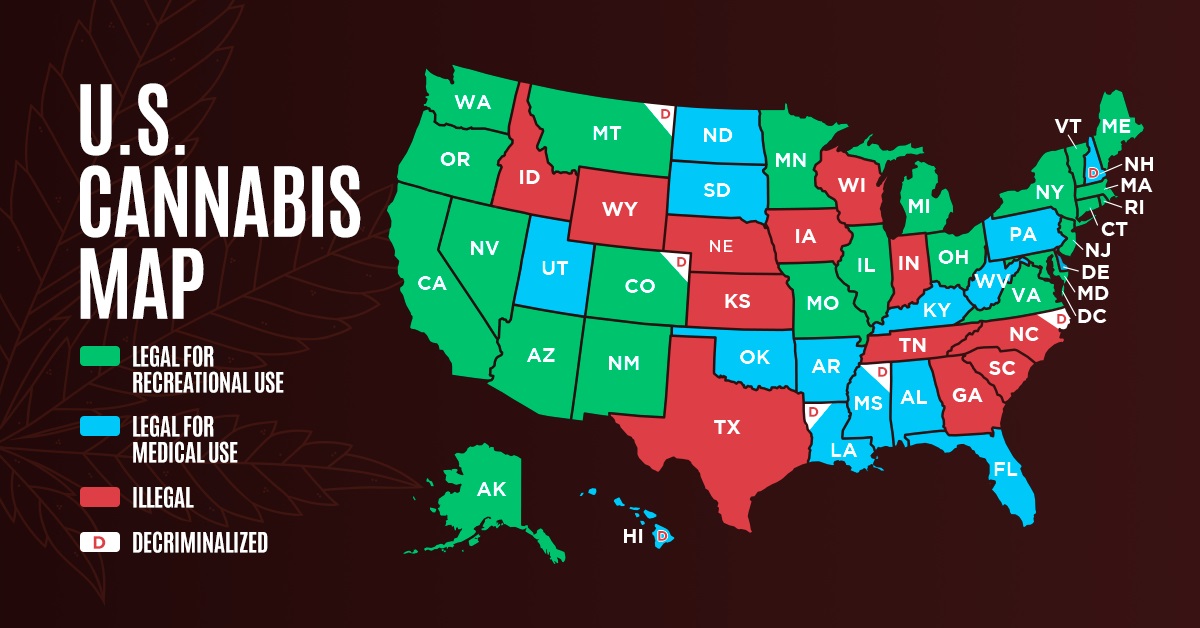There are currently 24 states in the United States that have legalized recreational marijuana as of May 2024, either by ballot measure or by legislative action. These states are:

- Alaska1: Legalized in 2014 by Ballot Measure 2 with 53% of votes. Allows possession of 1 oz usable, 6 plants (no more than 3 mature), and 1 oz hash/concentrates.
- Arizona2: Legalized in 2020 by Smart and Safe Arizona Act (Prop 207) with 59.95% of votes. Allows possession of 1 oz usable, 6 plants, and 5 g hash/concentrates.
- California3: Legalized in 2016 by Proposition 64 with 57% of votes. Allows possession of 1 oz usable, 6 plants, 8 g hash/concentrates.
- Colorado: Legalized in 2012 by Amendment 64 with 55% of votes. Allows possession of 1 oz usable, 6 plants (no more than 3 mature), and 1 oz hash/concentrates.
- Connecticut: Legalized in 2021 by SB 1201. Allows possession of 1.5 oz usable, 6 plants (no more than 3 mature beginning July 2023), up to 7.5 g concentrates (up to 750 mg of THC), up to 25 g concentrates (up to 2,500 mg of THC) in a locked container.
- Delaware: Legalized in 2023 by House Bill 1 and House Bill 2. Allows possession of 1 oz usable, 12 grams or less of concentrated cannabis, or cannabis products.
- District of Columbia: Legalized in 2014 by Initiative 71 with 65% of votes. Allows possession of 2 oz usable, 6 plants (no more than 3 mature).
- Illinois: Legalized in 2019 by House Bill 1438. Allows possession of 1 oz usable, 5 g hash/concentrates.
- Maine: Legalized in 2016 by Question 1 with 50% of votes. Allows possession of 2.5 oz usable, up to 15 plants (no more than 3 mature), 5 g hash/concentrates.
- Maryland: Legalized in 2022 by Maryland Question 4 (Marijuana Legalization Amendment) with 66.88% of votes. Allows possession of 1.5 oz usable, up to 2 plants for personal use, 12 g of cannabis concentrates.
- Massachusetts: Legalized in 2016 by Question 4 with 54% of votes. Allows possession of 1 oz usable, 6 plants, 5 g concentrates.
- Michigan: Legalized in 2018 by Proposal 1 with 56% of votes. Allows possession of 2.5 oz usable, 12 plants, 15 g concentrates.
- Minnesota: Legalized in 2023 by HF100. Allows possession of 2 oz usable in public, 2 pounds usable at home, 8 plants (no more than 4 mature), 800 mg of THC in edibles, 8 g of concentrate.
- Missouri: Legalized in 2022 by Amendment 3. Allows possession of up to 3 oz usable, up to 6 flowering plants, 6 immature plants, and 6 plants under 14 inches for personal use.
- Montana: Legalized in 2020 by Initiative I-190 (56.89%) and CI-118 (57.82%). Allows possession of 1 oz usable, 4 mature plants, 8 g hash/concentrates.
- Nevada: Legalized in 2016 by Question 2 with 54% of votes. Allows possession of 1 oz usable, 6 plants, 3.5 g hash/concentrates.
- New Jersey: Legalized in 2020 by New Jersey Marijuana Legalization Amendment with 66.88% of votes. Allows possession of 1 oz usable.
- New Mexico: Legalized in 2021 by House Bill 2. Allows possession of 2 oz usable, 6 plants (no more than 12 per household), 16 g concentrated marijuana, 800 milligrams of edible cannabis.
- New York: Legalized in 2021 by Senate Bill S854A. Allows possession of 3 oz usable, 12 plants, 24 g concentrates.
- Oregon: Legalized in 2014 by Measure 91 with 56% of votes. Allows possession of 1 oz usable in public, 8 oz homegrown usable at home, 4 plants, 16 oz solid marijuana-infused, 72 oz liquid infused, and 1 oz extract at home of hash/concentrates.
- Ohio: Recreational marijuana was legalized in Ohio by a ballot measure that passed on November 8, 2023, with 55 percent of the vote1. The measure, known as Issue 2, allows adults 21 and over to possess up to 2.5 ounces of marijuana and grow up to six plants at home.
- Rhode Island: Legalized in 2022 by Rhode Island Cannabis Act. Allows possession of 1 oz usable in public, 10 oz usable at home, 3 mature plants and 3 immature plants, 5 g concentrate.
- Vermont: Legalized in 2018 by Legislative Bill H.511. Allows possession of 1 oz usable, 6 plants (no more than 2 mature), 5 g hash.
- Virginia: Legalized in 2021 by Senate Bill 1406 and House Bill 2312. Allows possession of 1 oz usable, 4 plants.
- Washington: Legalized in 2012 by Initiative 502 with 56% of votes. Allows possession of 1 oz usable, 16 oz solid marijuana-infused, 72 oz liquid infused, and 7 g of concentrates.
It is important to note that marijuana laws are changing at a rapid pace across all 50 states and it’s important to understand and respect the rules that vary across the U.S. regarding marijuana use.
Marijuana laws are changing at a rapid pace across all 50 states, making things a bit confusing at times. In order to keep up with the ever-changing laws, DISA has provided an interactive map for information on legalization, medical use, recreational use, and anything in between. You can check out their website for more detailed information on the legality of marijuana in each state.
Even though marijuana may be legal in some states, it is still illegal under federal law. Possessing, growing, transporting, and distributing marijuana is a federal felony. Individual laws that have legalized marijuana for recreational or medical use have challenged the federal government, creating a contradiction between the rights of states to create their own regulations and the federal government’s power.

Cover Cannabis is a full-service consulting firm, and we can handle all of your cannabis insurance needs. Many of our clients rely on us to provide expert and quality service for their cannabis business operations. Learn about what types of Cannabis Operations can obtain Cannabis Insurance.
You can also request a quote specific to your insurance needs.




